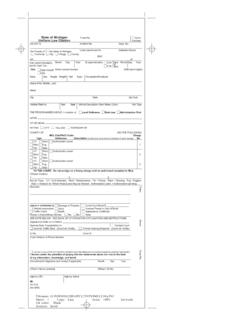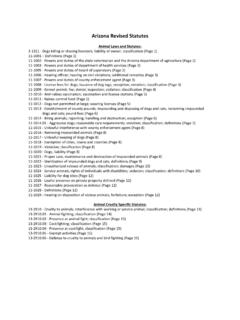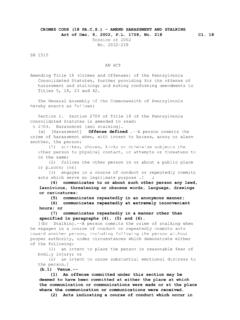Transcription of Arizona Revised Statutes - PACC911
1 Arizona Revised Statutes 3-1311 . Dogs killing or chasing livestock; liability of owner; classification A. If any person discovers a dog killing, wounding or chasing livestock, or discovers a dog under circumstances which show conclusively that it has recently killed or chased livestock, he may pursue and kill the dog. B. The owner of a dog is liable for damages caused by the dog chasing livestock. In the case of a dog killing or wounding livestock, the owner of the dog is liable for damages to the owner of the livestock equal to three times the value of the livestock killed or wounded. C. An owner of a dog who intentionally or recklessly allows or causes the dog to: 1. Wound or kill livestock owned by another person is guilty of a class 1 misdemeanor. 2. Chase livestock owned by another person, causing injury to the livestock, is guilty of a class 3.
2 Misdemeanor. 11-1001 . Definitions In section 13-1208 and in this article, unless the context otherwise requires: 1. "Animal" means any animal of a species that is susceptible to rabies, except man. 2. "At large" means being neither confined by an enclosure nor physically restrained by a leash. 3. "County board of health" means the duly constituted board of health of each county. 4. "County enforcement agent" means that person in each county who is responsible for the enforcement of this article and the rules adopted under this article. 5. "County pound" means any establishment authorized by the county board of supervisors for the confinement, maintenance, safekeeping and control of dogs and other animals that come into the custody of the county enforcement agent in the performance of his official duties. 6. "Department" means the department of health services.
3 7. "Impound" means the act of taking or receiving into custody by the county enforcement agent any dog or other animal for the purpose of confinement in a county pound in accordance with the provisions of this article. 8. "Kennel" means an enclosed, controlled area, inaccessible to other animals, in which a person keeps, harbors or maintains five or more dogs under controlled conditions. 9. "Livestock" means neat animals, horses, sheep, goats, swine, mules and asses. 10. "Owner" means any person keeping an animal other than livestock for more than six consecutive days. 11. "Rabies quarantine area" means any area in which a state of emergency has been declared to exist due to the occurrence of rabies in animals in or adjacent to this area. 12. "Stray dog" means any dog three months of age or older running at large that is not wearing a valid license tag.
4 13. "Vaccination" means the administration of an anti-rabies vaccine to animals by a veterinarian. 14. "Veterinarian", unless otherwise indicated, means any veterinarian licensed to practice in this state or any veterinarian employed in this state by a governmental agency. 15. "Veterinary hospital" means any establishment operated by a veterinarian licensed to practice in this state that provides clinical facilities and houses animals or birds for dental, medical or surgical treatment. A. veterinary hospital may have adjacent to it or in conjunction with it or as an integral part of it pens, stalls, cages or kennels for quarantine, observation or boarding. 16. "Vicious animal" means any animal of the order carnivora that has a propensity to attack, to cause injury to or to otherwise endanger the safety of human beings without provocation, or that has been so declared after a hearing before a justice of the peace or a city magistrate.
5 Page 1. 11-1002 . Powers and duties of the state veterinarian and the Arizona department of agriculture A. The state veterinarian, employed pursuant to section 3-1211, shall designate the type or types of anti-rabies vaccines that may be used for vaccination of animals, the period of time between vaccination and revaccination and the dosage and method of administration of the vaccine. B. The Arizona department of agriculture shall regulate the handling and disposition of animals classed as livestock that have been bitten by a rabid or suspected rabid animal or are showing symptoms suggestive of rabies. 11-1003 . Powers and duties of department of health services A. The department of health services shall regulate the handling and disposition of animals other than livestock that have been bitten by a rabid or suspected rabid animal or are showing symptoms suggestive of rabies.
6 B. The department of health services may require the county enforcement agent to submit a record of all dog licenses issued and in addition any information deemed necessary to aid in the control of rabies. 11-1005 . Powers and duties of board of supervisors A. Each county board of supervisors may: 1. Designate or employ a county enforcement agent. If such designation or employment is not made, the county sheriff shall be the county enforcement agent, but nothing in this article shall be deemed to prevent the county board of supervisors from designating or employing a county enforcement agent at any time it is deemed necessary or advisable. 2. Provide the county enforcement agent with such personnel and equipment as are necessary to enforce the provisions of this article and the rules adopted under this article. 3. Contract with any city or town to enforce the provisions of any ordinance enacted by such city or town for the control of dogs.
7 4. For the unincorporated areas of the county, by ordinance , regulate, restrain and prohibit the running at large of dogs, except dogs used for control of livestock or while being used or trained for hunting. 5. For the unincorporated areas of the county, by ordinance , regulate, restrain and prohibit the excessive and unrestrained barking of dogs. 6. Establish either: (a) Criminal penalties not to exceed the penalties for a class 2 misdemeanor for violation of an ordinance adopted pursuant to paragraph 4 or 5. (b) Civil penalties for violations of an ordinance adopted pursuant to paragraph 4 or 5, not to exceed five hundred dollars for each violation. B. Fines received for violation of an ordinance adopted with a criminal penalty pursuant to subsection A, paragraph 6, subdivision (a) shall be deposited in a special, permanent, nonlapsing and nonreverting county fund to be used solely for the operation of the county enforcement agency.
8 C. Each county board of supervisors may establish pound fees for impounding and maintaining animals at the county pound or any pound used by the county. D. The county board of supervisors shall be responsible for declaring a rabies quarantine area within its jurisdiction on a recommendation of the county board of health or the local health department. If a rabies quarantine area is declared, the county board of supervisors shall meet with the county board of health and the county enforcement agent and institute an emergency program for the control of rabies within that area provided that any regulations restricting or involving the movement of livestock within that area shall be developed by the state veterinarian. Page 2. 11-1006 . Hearing officer; hearing on civil violations ; additional remedies A. A county board of supervisors that establishes a civil penalty for violating an animal statute or ordinance may appoint one or more hearing officers to hear and determine such cases.
9 The board may appoint a county employee to serve as hearing officer in addition to his other work. B. The hearing officer shall hold a hearing on each violation reported by the county enforcement agent. Notice of the hearing shall be served personally on the defendant at least ten days before the hearing. The county enforcement agent shall use a uniform traffic ticket and complaint for civil traffic cases pursuant to the rules of procedure in traffic cases adopted by the supreme court, modified as applicable, in citing persons for violations of ordinances adopted with a civil penalty pursuant to section 11-1005, subsection A, paragraph 6, subdivision (b). C. At the hearing the county enforcement agent shall present evidence of the violation and the defendant, or his attorney or other designated representative, shall have an opportunity to present evidence.
10 The county attorney may represent and present evidence for the county enforcement agent. D. At the conclusion of the hearing the hearing officer shall determine whether a violation occurred and, if so, impose civil penalties provided for under section 11-1005, subsection A, paragraph 6, subdivision (b). Monies collected for civil penalties shall be deposited in the county general fund. The board of supervisors shall adopt, in the same manner as the animal ordinances, written rules of procedure for the hearings and review of hearings. Final decisions of the hearing officer under this subsection are subject to judicial review under title 12, chapter 7, article 6. E. In addition to other remedies provided by law, the board of supervisors, the county attorney, the county enforcement agent or a private individual or other entity that is specially damaged by a violation of an animal statute or ordinance may institute an injunction, mandamus, abatement or other appropriate action or proceeding to prevent or abate the violation.








